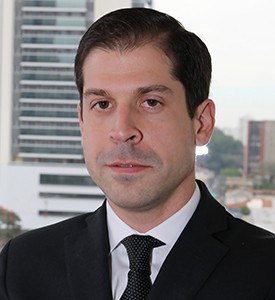
"Our strategic approach is to raise private investment, as we are currently not in a strong fiscal position to follow through on the projects with governmental funds.”
Share
The Government of Brazil is looking to reduce logistics bottlenecks by 2025. Can you elaborate on the new administration’s strategy to achieve this?
The government has a public company called EPL that is in charge of the long-term planning, specifically with regards to logistics. The plan for 2025 has been completed and is already public. We understand the bottlenecks present in the logistics space and therefore know which projects should receive priority.
Our strategic approach is to raise private investment, as we are currently not in a strong fiscal position to follow through on the projects with governmental funds. BNDES, Brazil’s national development bank, is in charge of producing all the projects that are necessary to establish public private partnerships for logistics, and we expect to complete this venture within the next two years.
What is the government’s strategy to create a more favorable climate for private investment in Brazil?
We in the government have the mission to generate a crowding-in effect, which is in essence attracting investment that stimulates the economy. In turn, we must create the regulatory and legal frameworks that are necessary to attract private money.
On the other hand and over the last few years, state owned companies have created a crowding-out effect; they have been practicing non-competitive prices in order to reduce private participation and justify their existence. It is thus important to reduce or eliminate the participation of state owned companies in some sectors to open the space for private investment. Considering the privatizations that we are currently conducting within government, selling state owned companies will allow for the private sector to scale in such a way to be competitive in a global market.
How will the government choose which projects to invest in, and are there any industries that will receive particular attention?
The priority of the government will be to choose the projects that will give the best return on investment. Imagine that there is a library of 1,000 different possible projects in Brazil. We will calculate the economic rate of return that each project will bring and compare the return to the costs of the project. In this way, we can prioritize the projects from the most reasonable and feasible to the least feasible. The government will also assess its capacities in terms of following through on projects and prioritizing the projects according to these capacities. Rather than prioritizing one particular industry, the emphasis will be on a merit basis. Our current goal is to grow Brazil’s GDP from 1.7% to 4% by 2022.
The Government of Brazil is looking to reduce logistics bottlenecks by 2025. Can you elaborate on the new administration’s strategy to achieve this?
The government has a public company called EPL that is in charge of the long-term planning, specifically with regards to logistics. The plan for 2025 has been completed and is already public. We understand the bottlenecks present in the logistics space and therefore know which projects should receive priority.
Our strategic approach is to raise private investment, as we are currently not in a strong fiscal position to follow through on the projects with governmental funds. BNDES, Brazil’s national development bank, is in charge of producing all the projects that are necessary to establish public private partnerships for logistics, and we expect to complete this venture within the next two years.
What is the government’s strategy to create a more favorable climate for private investment in Brazil?
We in the government have the mission to generate a crowding-in effect, which is in essence attracting investment that stimulates the economy. In turn, we must create the regulatory and legal frameworks that are necessary to attract private money.
On the other hand and over the last few years, state owned companies have created a crowding-out effect; they have been practicing non-competitive prices in order to reduce private participation and justify their existence. It is thus important to reduce or eliminate the participation of state owned companies in some sectors to open the space for private investment. Considering the privatizations that we are currently conducting within government, selling state owned companies will allow for the private sector to scale in such a way to be competitive in a global market.
How will the government choose which projects to invest in, and are there any industries that will receive particular attention?
The priority of the government will be to choose the projects that will give the best return on investment. Imagine that there is a library of 1,000 different possible projects in Brazil. We will calculate the economic rate of return that each project will bring and compare the return to the costs of the project. In this way, we can prioritize the projects from the most reasonable and feasible to the least feasible. The government will also assess its capacities in terms of following through on projects and prioritizing the projects according to these capacities. Rather than prioritizing one particular industry, the emphasis will be on a merit basis. Our current goal is to grow Brazil’s GDP from 1.7% to 4% by 2022.